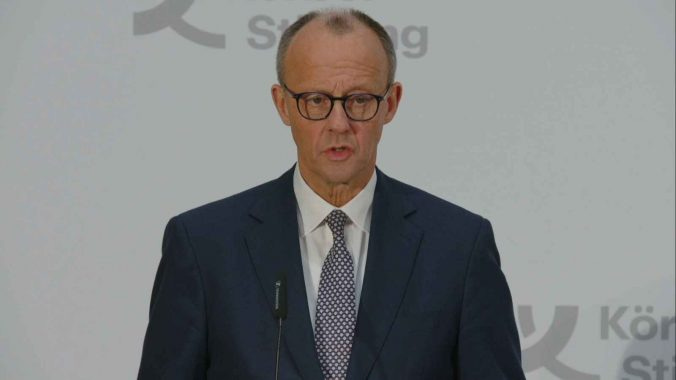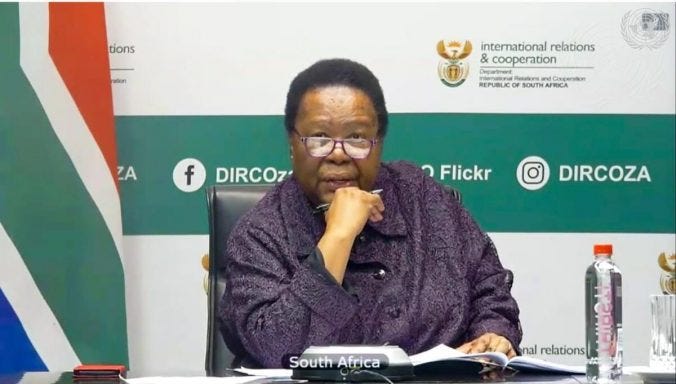German elites maintain the autopilot of militarisation
+ Naledi Pandor supports the Schiller Institute's “Oasis Plan” for the Middle East
Today I am providing my English translation of 2 short articles, both from Movisol.org and originally in Italian. (All emphasis mine in both).
The first one was published on Monday 17th February 2025.
German elites maintain the autopilot of militarisation
On 9th February [2025] there was the first televised debate between outgoing Chancellor Olaf Scholz (Social Democrat) and main challenger Friedrich Merz (Christian Democrat, photo), characterised by the scandalous absence of any reference to the fact that the world is changing politically and economically. Scholz and Merz may disagree on this or that particular aspect, but they agree on the misleading assumption that the world will be shaped by geopolitics and the free market economy. They believe that Russia will be the main threat to Europe and Germany, so substantial rearmament programmes are needed, regardless of whether the leaders of Russia and the US reach an agreement on Ukraine. They have no idea what constructive contribution Germany, after all a leading industrial export nation, can make to the new world economic system.
That said, the main disagreement between the two was over the size of the increase in the defence budget. For Scholz, it is enough if it is raised to two per cent of GDP. Merz wants three per cent. Both figures are difficult to achieve: two per cent would mean almost doubling the current expenditure (EUR 52 billion), while three per cent would triple it, bringing the defence budget to a quarter of the entire federal budget! And while Merz argues that he can finance this with economic growth (in a recession!), Scholz would like to remove the debt ceiling in the constitution, in line with the new line coming from Brussels.
Therefore, if - as generally expected - Merz wins the elections on 23rd February [2025], the policy of a new government led by him will not differ in substance from that of outgoing Chancellor Scholz, but will be worse in foreign policy.
The topic of reliable and affordable energy supplies, which cannot do without a resumption of gas imports from Russia, possibly by repairing the Nord Stream pipeline, was missing from the debate. Scholz and Merz did not say a single word about this pipeline that Russia is willing to use to pump gas back into Germany and Europe. The second crucial condition for preserving Germany's role as a leading industrial nation, a return to nuclear energy, was also not mentioned, which does not bode well for the country.
In fact, the transformation of parts of the ailing civil industry into arms manufacturers has already begun, with a historic rolling stock factory that will start building tanks as part of an agreement between the Franco-German KNDS group and the French railway manufacturer Alstom. KNDS will complete the acquisition of Alstom's railway carriage factory in the eastern German city of Görlitz in Saxony by 2027.
After the conversion of the facilities, the factory will produce parts for Rheinmetall's main battle tank, the Leopard 2, the Puma infantry fighting vehicle and the Boxer armoured fighting vehicle from 2027. KNDS has promised to keep most of the 700 jobs in Görlitz.
Military manufacturers have also started to systematically recruit workforce from the crisis-ridden automotive industry: for instance, radar and sensor specialist Hensoldt in Wetzlar wants to hire up to 200 employees from automotive suppliers Continental and Robert Bosch, who are suffering from loss of orders. Rheinmetall has just offered one hundred employees of the loss-making Continental (brakes) plant in Gifhorn the possibility of moving to a munitions factory. But this is only the beginning: more jobs will be created in the armaments industry. Most likely this is what Merz announced as the “economic growth” his government would like to trigger.
The second article that follows was published on Wednesday 19th February 2025.
Naledi Pandor supports the Schiller Institute's “Oasis Plan” for the Middle East
“I think the Oasis Plan presents a number of very useful proposals that could be considered by groups in the conflict, as a basis for further discussion” said Naledi Pandor, South Africa's former Minister of International Relations and Cooperation (2019-2024), host of the International Coalition for Peace's online meeting on 14th February [2025], dedicated to “Ending the Cycle of Violence in the Middle East”. “We need leadership”, the former Capetown diplomacy chief continued. “We need to find a way, through the Schiller Institute, to identify who are the adults in the room... Who is ready to make a serious commitment to actually solving the world's issues? I think the Schiller Institute, along with other associations of similar strength, could begin to take on that leadership role, primarily for the purpose of coming together, starting a discussion and developing an agenda”.
Ms. Pandor is internationally famous for pleading the case of the Israeli genocide against the Palestinians at the International Court of Justice. She attended the meeting alongside coalition co-founder Helga Zepp-LaRouche, Donald Ramotar, former President of Guyana (2011-2015) and Dennis Fritz, Director of the Eisenhower Media Network.
In her opening remarks, Ms Zepp-LaRouche stressed the urgency of debate and activation, because “the old order is crumbling, but the new order has not yet taken shape”. “We are in the midst of the dramatic change of an era”, she added, “which on the one hand is full of incredible dangers - such as that of a global nuclear war, which is not yet completely ruled out - but on the other hand, I think we can absolutely hope that if we unite our efforts, with a New Paradigm we can bring humanity into a better era”.
The Middle East is the most pressing issue today, Ms Zepp-LaRouche noted, rejecting the proposal launched by President Trump to force the Palestinian population to leave Gaza to build a “Riviera” there. On the contrary, the Oasis Plan is the necessary approach for serious and lasting reconstruction, not only for Israel and Palestine, but for the entire region, together with a two-state solution and pending the Arab peace plan that should be announced soon. Greening the desert, ensuring an adequate supply of drinking water and promoting economic development would not only put an end to the armed conflict, but also help to eliminate the reasons for the migration crisis.
Ms Pandor agreed with these remarks and issued a warning: “If we miss this opportunity, we can only imagine the chaos that awaits us. So, this is a time when we need to use all the institutional capacities at our disposal to ensure that we return to rationality and engage in discussions and processes that address our deep-seated problems of inequality, lack of livelihoods, insecurity caused by conflict... I think we now need to build a truly practical and effective global coalition that addresses these development challenges... I agree with the former President of Guyana when he says that there is a very important link between peace and development”.
At the beginning of the dialogue, Donald Ramotar and Dennis Fritz also endorsed the Oasis Plan as an important contribution to building peace and prosperity.






I found the second article inspiring. The first? What is it with Germany? I wish more of them would read the second article.
Germans are gluttons for punishment.